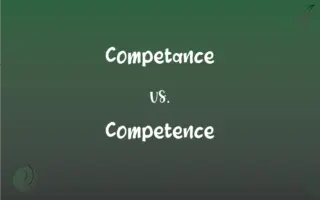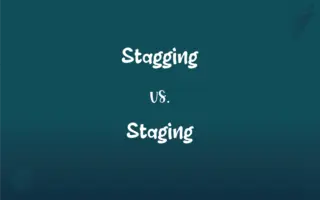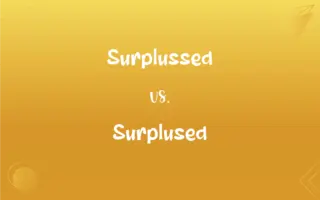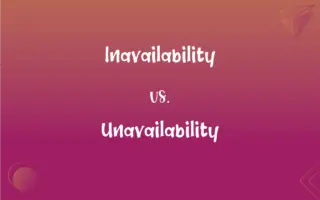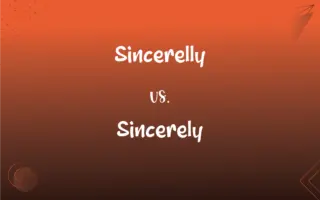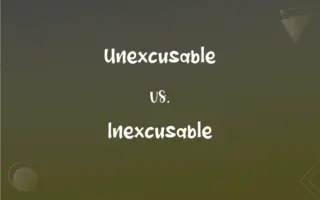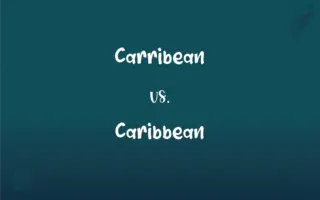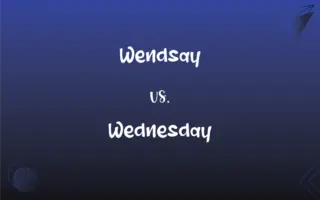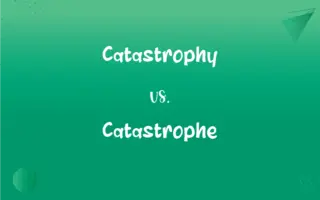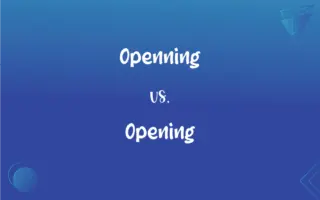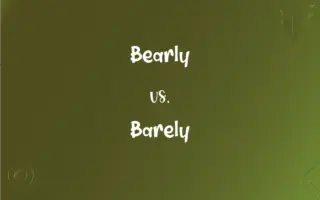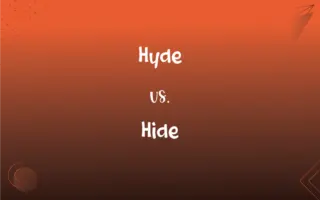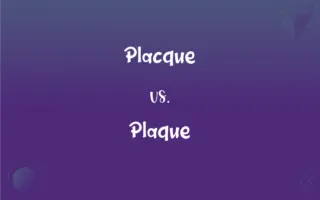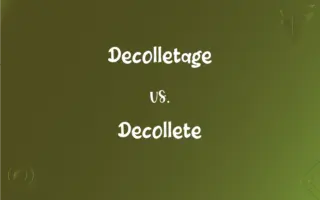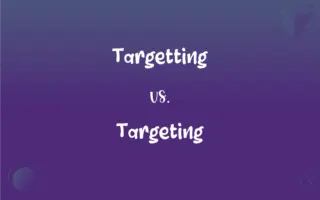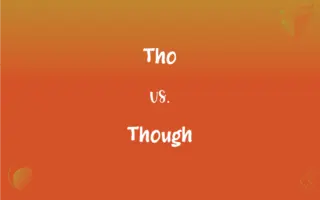Abaut vs. About: Mastering the Correct Spelling
Edited by Aimie Carlson || By Janet White || Published on May 8, 2024
"Abaut" is an incorrect spelling; the correct spelling is "about," which refers to a preposition or adverb indicating direction, location, or subject of conversation.

Which is correct: Abaut or About
How to spell About?

Abaut is Incorrect

About is Correct
ADVERTISEMENT
Key Differences
Remember that "about" uses 'o', similar to "around," both indicating a circular motion or completeness.
Think of "about" as surrounding something; 'o' represents a circle or cycle.
Associate "about" with "out," as both can indicate direction or vicinity.
Pronounce "about" phonetically to remember the correct spelling with 'o' and 'u'.
"About" has only one 'b', just like "above," both representing a spatial or conceptual relationship.
ADVERTISEMENT
Correct usage of About
I'm not sure what you're talking abaut.
I'm not sure what you're talking about.
He wrote an essay abaut his summer vacation.
He wrote an essay about his summer vacation.
She asked abaut the homework assignment.
She asked about the homework assignment.
They were discussing abaut the new movie.
They were discussing about the new movie.
Can you tell me more abaut it?
Can you tell me more about it?
About Definitions
Concerning or regarding a specific topic.
The meeting is about the new policy.
In the vicinity or surrounding area.
The children played about the park.
Nearly or approximately in quantity or degree.
It's about five miles to the coast.
In the opposite direction or turning around.
The soldier turned about when called.
In a state of readiness or on the verge of doing something.
He was about to leave when the phone rang.
Approximately; nearly
The interview lasted about an hour.
Almost
The job is about done.
To a reversed position or direction
Turn about and walk away slowly.
About Sentences
Can you tell me about your favorite hobby?
The book about ancient Egypt was fascinating.
I asked my friend about her weekend plans.
She wrote a story about a magical forest.
He shared a fact about the solar system.
I'm curious about different cultures around the world.
She'll give a speech about environmental conservation.
The teacher explained the theory about gravity.
Let's talk about ways to save energy at home.
The documentary about undersea life was captivating.
They're making a poster about healthy eating habits.
I heard a song about friendship and loyalty.
He's reading an article about the importance of exercise.
I learned a lot about space exploration from the book.
The movie about the adventurous journey was inspiring.
I'm reading a novel about a mysterious island.
Let's find out more about recycling and its benefits.
The debate about climate change was very informative.
She has a collection of stamps from about the world.
Can we discuss about the science project tomorrow?
Do you know any facts about the deepest oceans?
He gave a presentation about renewable energy sources.
I enjoyed the lecture about the history of computers.
The museum exhibit about dinosaurs is open today.
The story about the lost puppy had a happy ending.
About Idioms & Phrases
How about that?
An expression of surprise or amazement.
He won the championship again this year. How about that?
Think about
To consider or ponder something.
Think about your choices before you make a decision.
Dream about
To imagine or desire something in the future.
He dreams about becoming an astronaut one day.
Worry about
To feel anxious or concerned about something.
You shouldn't worry about the test too much; you've studied hard.
Happy about
To feel pleased or content with a situation.
They were very happy about the new addition to their family.
Talk about a small world
Used when you encounter someone in an unexpected place, or when you discover mutual acquaintances.
When I ran into my high school teacher in Paris, all I could say was, Talk about a small world!
About time
Something that should have happened earlier is finally happening.
It's about time they fixed the road; it's been full of potholes for years.
All about
To be focused or interested in a particular thing.
She's all about healthy living and exercises daily.
Something about
Indicates there is a particular quality or feature that is noticeable.
There's something about this painting that's really captivating.
Excited about
To feel enthusiastic or eager about something upcoming.
She's really excited about starting college in the fall.
Talk about
To discuss or mention a topic.
Let's talk about your plans for the summer.
Go about
To proceed with a task or to handle a situation.
How should we go about organizing the charity event?
Learn about
To acquire knowledge or information on a subject.
In history class, we will learn about ancient civilizations.
Joke about
To make humorous remarks or comments about something.
They love to joke about their high school memories.
Complain about
To express dissatisfaction or annoyance about something.
He always complains about the weather in the city.
Curious about
To have a strong desire to know or learn something.
The child was curious about the stars and the moon.
Serious about
To have a sincere and earnest intention or belief.
Are you serious about moving to another country?
Mad about
To be very enthusiastic or passionate about something.
He's mad about vintage cars and collects them.
Forget about
To fail to remember or consider something or someone.
Sometimes, it's better to forget about the past and move forward.
Change one's mind about
To alter one's opinion or decision regarding something.
After seeing the evidence, he changed his mind about the suspect.
Care about
To feel concern or interest in something or someone.
It's important to care about the environment and protect it.
FAQs
Why is it called about?
It's called "about" from Old English "onbūtan," meaning "on the outside of," reflecting its use in indicating location, direction, or subject.
What is the pronunciation of about?
About is pronounced as /əˈbaʊt/.
What is the root word of about?
The root is from Old English "onbūtan," which means "on the outside of" or "around."
Which vowel is used before about?
The vowel "a" is used at the beginning of about.
What is the singular form of about?
About is both singular and plural; it doesn't change form.
Which conjunction is used with about?
Conjunctions aren't typically paired with "about," but in sentences, "and" or "but" can be used in clauses that include "about."
Which article is used with about?
Articles are not commonly used directly with "about." The choice of article depends on the noun that follows it, e.g., "about the issue."
What is the plural form of about?
About doesn't have a plural form; it's used the same way for singular and plural contexts.
Is about a noun or adjective?
About is neither a noun nor an adjective; it's a preposition or an adverb.
Is about an abstract noun?
About is not a noun; it's a preposition or an adverb.
What is the verb form of about?
About does not have a verb form; it's a preposition or an adverb.
Is about an adverb?
Yes, about can function as an adverb.
Is about a vowel or consonant?
The word "about" contains both vowels and consonants.
Is about a countable noun?
About is not a noun; it's a preposition or an adverb, so the concept of being countable doesn't apply.
What is a stressed syllable in about?
The second syllable, "bout," is stressed in about.
Is about a collective noun?
No, about is not a noun, so it can't be a collective noun.
Is the word about imperative?
No, about is not imperative; it's a preposition or an adverb.
What is the first form of about?
About is not a verb; it doesn't have different forms. As a preposition or adverb, it remains "about."
What is the third form of about?
There is no third form; about is a preposition or an adverb.
Which preposition is used with about?
About itself is a preposition, so it doesn't typically require another preposition with it.
Is the about term a metaphor?
About can be used metaphorically in certain contexts, but it is not inherently a metaphor.
How do we divide about into syllables?
About is divided as a-bout.
What part of speech is about?
About is a preposition when it shows the relationship of direction, location, or subject, and an adverb when it modifies a verb.
What is another term for about?
Another term for about can be "regarding" or "concerning" when used as a preposition, and "approximately" when used as an adverb.
What is the opposite of about?
The opposite could be "unconcerning" or "irrelevant" for the prepositional use, and "precisely" or "exactly" for the adverbial use.
What is the second form of about?
There is no second form; about is a preposition or an adverb.
Is about a negative or positive word?
About is neutral; it's neither inherently negative nor positive.
Which determiner is used with about?
Determiners are not typically used directly with "about."
How is about used in a sentence?
"He told a story about his adventures in Africa."
How many syllables are in about?
There are two syllables in about.
About Author
Written by
Janet WhiteJanet White has been an esteemed writer and blogger for Difference Wiki. Holding a Master's degree in Science and Medical Journalism from the prestigious Boston University, she has consistently demonstrated her expertise and passion for her field. When she's not immersed in her work, Janet relishes her time exercising, delving into a good book, and cherishing moments with friends and family.
Edited by
Aimie CarlsonAimie Carlson, holding a master's degree in English literature, is a fervent English language enthusiast. She lends her writing talents to Difference Wiki, a prominent website that specializes in comparisons, offering readers insightful analyses that both captivate and inform.

